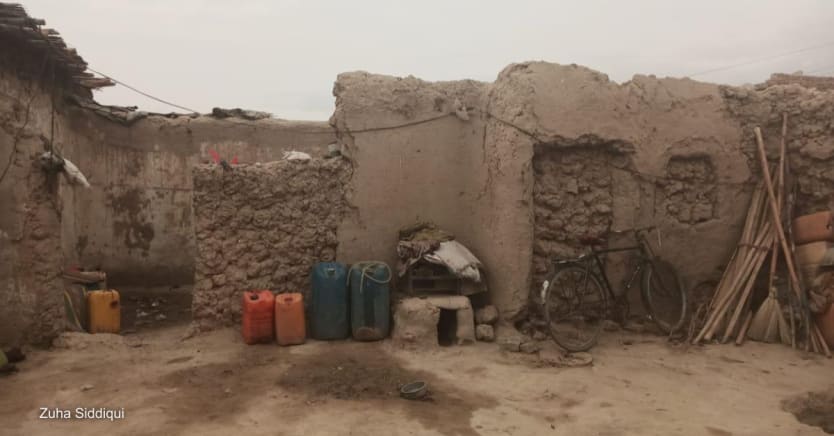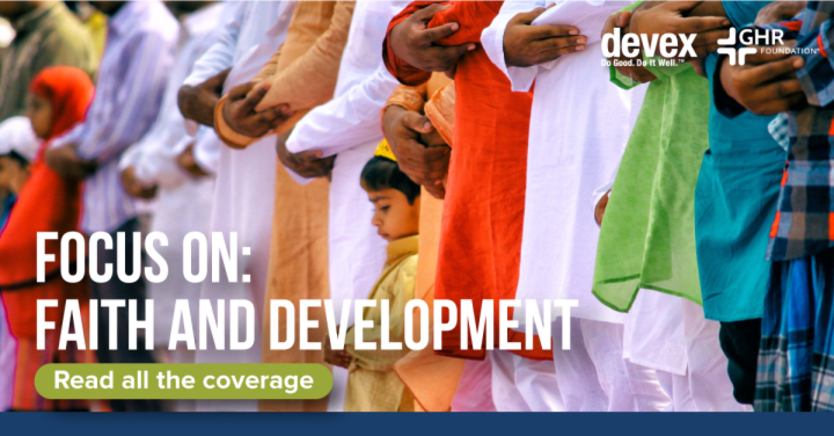
50-year-old Sharjeela lives in a mud house close to Baleli road. Photo by: Zuha Siddiqui
QUETTA, Pakistan – Sixty-year-old Gul Khan arrived in Quetta from the northern Afghan city of Mazar-e-Sharif on Oct. 3, carrying nothing but the clothes on his back, with four kids in tow. The youngest is 7 years old. He paid 35,000 Afghani — nearly $386 — to a smuggler at the Pakistan-Afghanistan border at Chaman, bordering Quetta. Now, he has no money left, and no roof over his head. And as temperatures in Quetta drop below 12 degrees Celsius, Khan fears his family will starve.
Part of our Focus on: Faith and Development
This series illuminates the role faith actors and their communities play in strengthening global development outcomes.
Khan told Devex that hundreds of families have crossed over to Chaman since the Taliban took over Kabul, even though the border remains officially closed. But in Pakistan, he said, they have received a cold reception.
Though faith actors had initially committed to assisting the expected influx of Afghan refugees, the Pakistani government’s reluctance to open its borders has restricted organizations from providing much-needed assistance.
Officially, Pakistan hosts the world’s largest population of Afghan refugees — nearly 3.5 million, according to government officials. These numbers include refugees who have lived in Pakistan for more than 30 years and crossed over from Afghanistan to flee the Soviet invasion. It also includes children of Afghan migrants who are denied citizenship, despite Pakistan being among the 30 countries in the world that offer unconditional birthright citizenship — meaning that a child born on Pakistani soil is entitled to a passport.
“When we started working [in August] we thought international NGOs and relief organizations would eclipse our work, with their large budgets and resources … But that never happened.”
— Naseer Achakzai, student activistBut in Pakistan, prejudice against Afghans runs deep. In 2018, when Pakistan’s Prime Minister Imran Khan announced that his government would grant citizenship to children of Afghan refugees, opposition parties as well as allies were quick to lash out, including the former chief minister of the province of Balochistan, which borders Afghanistan, Jam Kamal, who argued that there was proof of refugees being involved in terrorism. Others cited demographic concerns and the prospect of overpopulation and unemployment.
Now, the Pakistani government is reluctant to allow a fresh wave of Afghan refugees entry into the country, holding the official position that “there are no Afghan refugees and no refugee camps in Pakistan.” On Sept. 15, the province of Balochistan gave orders to criminalize anyone offering refuge to Afghan refugees and warned of strict repercussions.
After the Taliban takeover of Afghanistan, Caritas Pakistan — the social arm of the Catholic church in Pakistan — indicated that they were gearing up to provide humanitarian assistance to Afghans fleeing the Taliban. The organization said it was preparing to provide for short-term needs such as water, food, first aid, and immunization, as well as mid-to-long term needs such as mental health, trauma, chronic diseases, and education.
But two months down the line, a spokesperson from the organization, said they are still “waiting for a go-ahead from the [Pakistani] government.”
“The government has not allowed us to work, and so we cannot do anything right now,” he said. Adding that they couldn’t operate or carry out relief efforts without government approval.
EU weighs restarting development work in Afghanistan, avoiding Taliban
Amid warnings of a pending catastrophe in Afghanistan, the EU wants to do more than traditional humanitarian work, while circumventing the new Taliban government.
At the onset of the crisis Afghan Hazaras — a persecuted ethnic group in Afghanistan had found refuge in mosques and imambargahs in Quetta. But now, these mosques are deserted as refugees fleeing deportations have moved on. Swathes of refugees have been deported from Pakistan back to Afghanistan — approximately 965 from Quetta, and 1,486 from other cities, according to local reports.
An assistant professor at a public university in Quetta — who has been working with refugees for the past two years — said that the situation of refugees in the city is in a state of constant uncertainty. They asked to remain anonymous fearing reprisal from state authorities.
“Pakistan is not a signatory to the U.N. refugee convention — the 1951 Geneva Convention — so there is no responsibility on the Pakistani state to accept people or extend them any protection,” they added.
Student activist Naseer Achakzai and his peers organized donation camps and drives across Quetta in August and September and were able to support 120 refugee families over a month and a half. But after the government’s directives on Sept. 15 — seeking to criminalize and deport refugees — Achakzai said his group of student volunteers is no longer working with refugees, and that they are exhausted — adding that there are no organized relief efforts in the city.
“When we started working [in August] we thought international NGOs and relief organizations would eclipse our work, with their large budgets and resources,” he said. “But that never happened, they never came [to Quetta].”
Who will step up for refugees fleeing Afghanistan?
A handful of high-income countries have increased their quotas for Afghan asylum-seekers, but international organizations are calling for broader commitments.
According to Achakzai, the long-running Afghan refugee crisis — spanning nearly 30 years — is a possible reason for the lack of monetary support and funding for refugee rehabilitation in Pakistan. “People aren’t really paying attention [to refugees] anymore here,” he said, and subsequently, NGOs are less likely to receive funding for rehabilitation projects.
“Most importantly, our government has expressed no interest to rehabilitate Afghans in the country, and the uncooperative climate probably makes it even harder for NGOs to raise money or do work here.”
Other countries are also reluctant to allow entry to a new “wave” of Afghan migrants, including Turkey and Greece. Both countries have imposed new border controls and restrictions and have urged Afghanistan’s neighbors to provide support to fleeing populations.
On Quetta’s Baleli road, Khan and his family have set up a makeshift tent, tying together scraps and rags to bamboo sticks. The makeshift shelters are unlikely to survive Quetta’s harsh winter. Nearby, 50-year-old Sharjeela — also from Mazar-e-Sharif — spins raw wool into yarn, which she sells for pittance in a nearby market. She said her husband is paralyzed from the waist down, and all their money and savings — nearly 30,000 Afghani, about $331 — were spent crossing over to Pakistan.
She said that choosing to come to Pakistan was a decision she made with her husband overnight. In Mazar-e-Sharif, her children had no food, and she was not able to earn a living. It took them three days to reach the border at Chaman, after which they were able to cross over to Pakistan with the help of a smuggler. At least in Quetta, she said, there remains a sliver of hope, and the possibility that their children might have a better future in store for them. But if they get deported, Sharjeela fears her family will starve to death in Afghanistan.
For now, Khan and Sharjeela, and their respective families plan on staying in Pakistan until the end of winter. “When summer dawns and brings new hopes, I might go back to my homeland,” Khan said. “But for now, this is our home.”
Devex, with support from our partner GHR Foundation, is exploring the intersection between faith and development. Visit the Focus on: Faith and Development page for more. Disclaimer: The views in this article do not necessarily represent the views of GHR Foundation.

